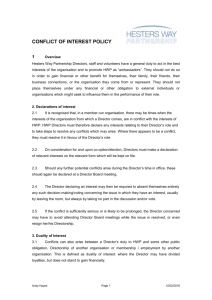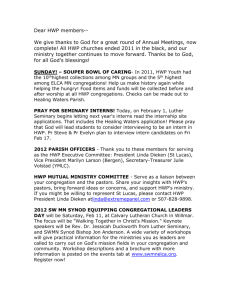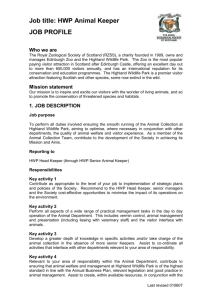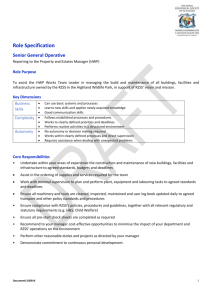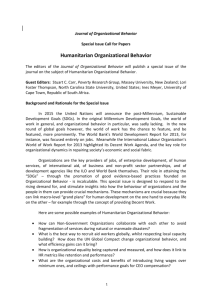Humanitarian Work Psychology General bmore Overview 1
advertisement
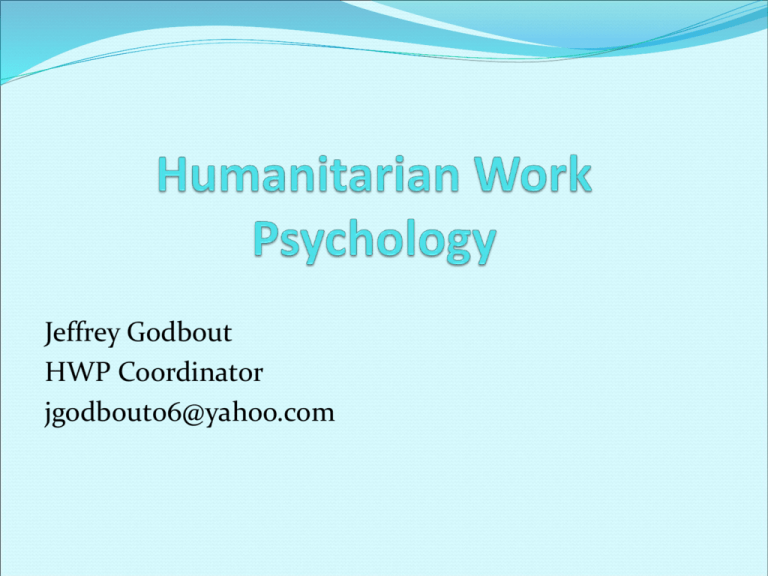
Jeffrey Godbout HWP Coordinator jgodbout06@yahoo.com Questions to be Answered What is Humanitarian Work Psychology (HWP)? What is the Global Task Force and Network for HWP? Who is doing what and what is being done? How YOU can get involved? What books/articles are available to learn more? The Why is up to You! HWP - Background Small Community of I/O Psy working on Humanitarian Issues Call for Global Task Force (2008) London Conference UCL HWP Defined (sort of!) New Zealand (June 2009) (Aug 2009) November 2009 Millennium Development Goals Millennium Development Goals (Issues) Paris Declaration on Aid (Policy) (1) Eradicate extreme poverty & hunger (2) Achieve universal primary education (3) Promote gender equality and empower women (4) Reduce child mortality (5) Improve maternal health (6) Combat HIV/AIDS, malaria & other diseases (7) Ensure environmental sustainability (8) Develop a global partnership for development – E.g., open trade, governance, private sector Ownership – Source: Annan (2000) – The “MDGs” are not without critics, e.g., Easterly (2006) – Easterly focuses a lot on ‘bottom-up’ dynamics… Managing for Results Mutual Accountability Alignment Harmonization HWP - Background Small Community of I/O Psy working on Humanitarian Issues Call for Global Task Force (2008) London Conference UCL HWP Defined (sort of!) New Zealand (June 2009) (Aug 2009) November 2009 Key Questions • How can I/O psychology impact the outcomes of the MDG and other Human Rights based policies? • Where is I/O’s presence? • How do we get I/O perspectives to be taken more serious in this context? • How do we become more responsive, and socially responsive - as a Discipline, and as a Profession? Call for a GLOBAL TASKFORCE ON ORGANISATIONAL PSYCHOLOGY FOR DEVELOPMENT (Stuart Carr) http://poverty.massey.ac.nz/ • Poverty reduction and international development cooperation present enormous challenges and opportunities to those who seek to improve people's lives through work psychology. A major international response is required to address these challenges. The nternational community of work/industrial/organisational psychologists wish to work in partnership with others who have similar interests to develop a global initiative which can b a powerful mechanism to identify how, where and when psychology can contribute t poverty alleviation, particularly as it affects the lives of those in low income countries. • We call for the establishment of a global initiative to bring the potential benefits work/industrial/organisational psychology to bear on the reduction of human poverty. These areas of psychology should play a key role in the consultation, design, delivery and evaluation of international aid; in the partnerships on which capacity development depends; and in the provision of essential human services to health, education and industry. While some important work has already been done in these areas the potential contribution of work/industrial/organisational psychology is greatly underdeveloped. A Global Taskforce is needed to identify how to step up the scale, impact and funding of such activities, and to do so in an integrated fashion. The Global Taskforce should have broad representation from low, middle and highincome countries, and ensure that efforts to address poverty do not reproduce the injustices that often give rise to it. The Task Force should be non-aligned to interests arsing from national or professional society affiliations, and should use the human rights values espoused by the UN as its touchstone. • Millions of people the world over are working in organizations that have a positive influence on poverty reduction. We call for a Global Taskforce that will help to align work psychology initiatives for poverty reduction and to harmonise them with efforts towards realising the MDGs. • We ask the UN to mandate a Global Task Force on Organisational Psychology for Development. HWP - Background Small Community of I/O Psy working on Humanitarian Issues Call for Global Task Force (2008) London Conference UCL HWP Defined (sort of!) New Zealand (June 2009) (Aug 2009) November 2009 Global Task Force London Summit June 2009, UCL • The meeting was convened in order to facilitate an exchange of current research between Task Force members, to develop a research agenda for the future, and to plan a forthcoming book on the Organizational Psychology of the future. • Outcomes – Humanitarian Work Psychology – Global Task Force For HWP – Network For HWP – Future agenda for HWP future – Book Outline HWP - Background Small Community of I/O Psy working on Humanitarian Issues Call for Global Task Force (2008) London Conference UCL HWP Defined (sort of!) New Zealand (June 2009) (Aug 2009) November 2009 Humanitarian Work Psychology (Humanistic Application of I/O Psychology) Humanitarian Work Psychology (HWP) is the application of Organizational Psychology to the humanitarian arena, especially poverty reduction and the promotion of decent work, aligned with local stakeholders' needs, and in partnership with global aid/development groups. Humanitarian Arena Workers Organizations Foreign & Local (Expat, Vol, Intern, etc.) Multilateral, NGO, National, Gov, Conslt, Commercial, etc. Outcomes Policies, Aid Delivery, Objectives, etc. Impact on Local Community •Community Relations •Economic •Environment (e.g. Resource Depletion) •Wellbeing •General Presence (local) •Employment •Employee treatment •Industry Competition •Dependence & Sustainability •Global/Local Perception Global Task Force for HWP Network for HWP • The Network for HWP is an • • • • The GTF is a steering committee of I/O practitioners, academics and students with a broad representation of low to high income countries ushering in a new era of greater practical application of I/O expertise in global development. Practice, promote, and advance HWP and its socially responsible agenda, promote a role for work psychology in improving: the design, delivery and evaluation of international aid; the partnerships on which capacity development depends; and the provision of essential human services to health, education and industry. GTF Co-Chairs Stuart Carr Mary O’Neill Berry Leo Marai international, non-partisan organization for anyone interested in practicing, promoting, developing, or learning more about HWP. Mission To foster the practice, promotion and development of HWP by unifying an international community focused on aligning prosocial agendas and decent work with local needs. HWP’s Levels GTF for HWP Network for HWP HWP Partnerships Humanitarian Arena Global Impact HWP – Research and Practical Application Examples Research Practical Application Project AddUp (Carr, et al 2005; Carr, et al. Smart Aid (Adkins & Thompson 2009) in press) Explores the effects of aid salary discrepancies in the health, education and business sectors of six countries – landlocked economies of Malawi and Uganda; transition economies of India and China; island economies of the Solomon Islands and Papua New Guinea. Motivation in Educational The Centre for Socio-Eco- Nomic Development (www.CSEND.org) Centre for Global Health (www.medicine.tcd.ie/global-health/) Setting (McLachlan & Tumwebaze, 2009) Teacher motivation in developing setting and the systematic changes that need to take place. Less brain drain. Attribution (McWha, & Carr, 2009) Positive vs. Negative Images of poverty and attributions for poverty. UN and ILO Ambassadors (Workshops, Training, Consulting (Stuart Carr, Mary O'Neill Berry, Walter Reichman, others) Teaching (Carr, NZ; Foster-Thompson, Spain 2009) Getting Involved… Take time to understand HWP Express interest in research/practice HWP Use multimedia avenues to get involved and share your thoughts Join the Network for HWP through - Facebook group ‘HWP Network’; Povio, the intranet for HWP; and the website (www.humworkpsy.org) READ - books/articles/journals Attend conferences (I/O discipline, Humanitarian arena) Pursue professors and practitioners working in HWP Identify journals calling for HWP topics Look to public sector for opportunities Take a job at a business with CSR as a high priority or other prosocial agendas and join those groups; Use the organizations reputation to start projects grounded in HWP principles Start your own projects - look for funding from family/friends/businesses/rotary clubs/etc. Volunteer and/or Intern Travel Always be thinking of ways to apply what you learn to your career as a Humanitarian Work Psychologist. Opportunities UN, ILO, and other intergovernmental organizations NGO internal and external consulting, management Government (public policy, development sector, etc) Public and Private sector (socially responsible agendas and projects, etc.) Internships with the above mentioned organizations Internships with HWP or similar organizations (PsySR, SPSSI, etc.) Universities (TA, RA, exchange w/ low-high income countries, courses, teaching) Dissertation & thesis Research and projects…be creative! (Journals are looking for HWP papers) Collaborate with I/O psychologists and universities from low-, middle-, and high-income countries Personal Projects Teaching, Research, Consulting (Papua New Guinea, other developing country) Grant (12 in 12) SIOP Symposium (Atlanta, 2010) Organizing and developing Network for HWP HWP Rep – Presentation series (Univ., Orgs, Other) Paper submissions (Psychology international and societieswithoutborders.org) Case Examples • #1 Example Scenario (Imagine you are a HWP Consultant) – A large donor for an aid organization demanded that the expertise of a Humanitarian Work Psychologist be used to help select Indonesian academics for aid scholarships that allow them to complete their undergraduate - PhDs at American Universities. You have been selected, but the donors last minute demands mean that you will be flying out in 5 days to remote islands in the Eastern provinces of the Indonesian Archipelago. The aid organisation who has selected you (a big honour, a potential major client for the future) has done this for years, but amazingly there is no documentation of the process, and no archives to access, no organizational memories of past selection processes. You have no expertise in selection for educational scholarships. You do not know who you will be working with on the selection panel. What do you do? • #2 Review work of Dr. Morris in Afghanistan – see “Good Work” in Landy, 2009. Contacts and Media Channels Website (www.humworkpsy.org) Povio-intranet for HWP (email sympa@lists.massey.ac.nz with the subject of your email “Subscribe Povio” Facebook - group HWP Network HWP Rep: 301-300-7463, iohumanist@gmail.com Questions Answered! What is Humanitarian Work Psychology (HWP)? (slide 8, 9, 11) What is the Global Task Force and Network for HWP? (slide 10) What is currently being done and by who? (slide 12, 16) Opportunities & how YOU can get involved? (slide 13, 14, 17) What publications are available to learn more? (slide 12, 19) The Why is still up to You! References…more on website Books Carr, S. C., McAuliffe, E., & MacLachlan, M. (1998). Psychology of aid. New York: Routledge. Carr, S.C., Shumaker J.F. (eds) (1996). Psychology and the Developing World. Conn: Praeger Carr, S.C., & T.S. Sloan (eds) (2003) Poverty & Psychology: From Global Perspective to Local Practice. New York: Kluwer-Plenum. Furnham, A. & Lewis, A. (1986). The Economic Mind: The Social Psychology of Economic Behavior. St Martins Press, New York. MacLachlan, M., Carr, S. C., & McAuliffe. E. (2010). The Aid Triangle: Human Dynamics of Dominance, Justice and Identity. London: Zed Books. Owusu-Bempah, K. & Howitt, D. (2000). Psychology Beyond Western Perspectives. Leicester: BPS. Yiu, L., & Saner, R. (2005). Decent work and poverty reduction strategies (PRS): An ILO advocacy guidebook. Geneva: ILO. Articles • • • • • • • Carr S. C. (2007) I/O Psychology and Poverty Reduction: Past Present and Future. The Industrial-Organizational Psychologist, 41, 1, 43-50. Carr, S. C., Hodgson, M. R., Vent, D. H., & Purcell, I.P. (2005). Pay diversity across work teams: Doubly demotivating influences? Journal of Managerial Psychology, 20(5), 417-39. Carr, S. C., MacLachlan, M., Reichman, W., Klobas, J., O’Neill Berry, M., & Furnham, A. (2008). Organizational Psychology and Poverty Reduction: Where Supply Meets Demand. Journal of Organizational Behavior, 29, 843-851. Lefkowitz, J. (2008). Expand the values of organizational psychology to match the quality of its ethics. Journal of Organizational Behavior, 29, 439–453. Furnham, A. (1982). 'Why are the poor always with us? Explanations for poverty in Britain', British Journal of Social Psychology, 21, 311-322. Furnham, A. & Procter, E. (1989). 'Belief in a just world: review and critique of the individual difference literature', British Journal of Social Psychology, 28, 365-384 MacLachlan, M., & Carr, S. C. (2005). The human dynamics of aid. OECD Policy Insights,10, http://www.oecd.org/dev/insights.
